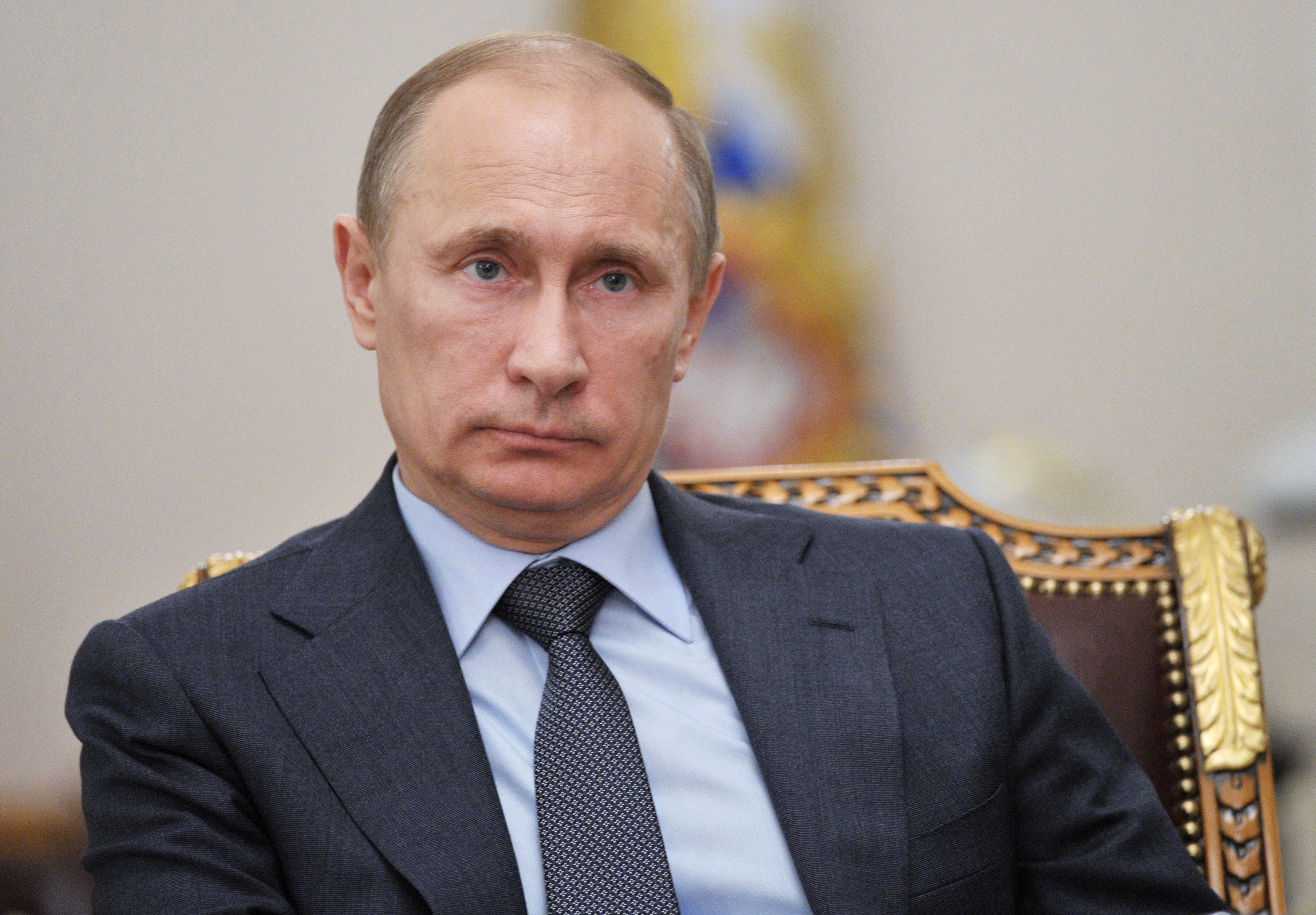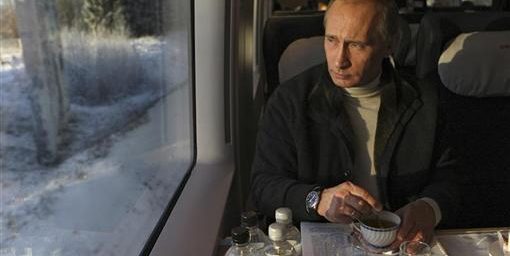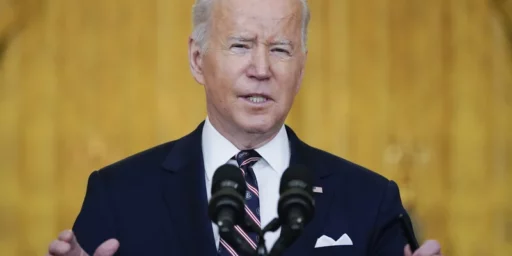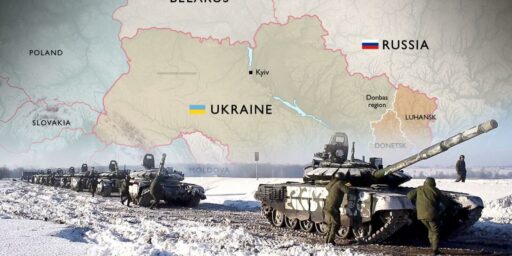Russia’s Economic Problems Just Getting More Grim By The Day
For a year that started out with regaining long-lost territory in Ukraine, 2014 is not ending so well for Vladimir Putin's Russia.
The combination of falling oil prices and sanctions from the West related to its policies in Ukraine and elsewhere appears to be having an impact on the Russian economy, and so far at least Moscow’s efforts to deal with the immediate impact of these twin economic pressures does not seem to be working. There have been signs that things in Russia were starting to turn sour earlier this month, of course, when the Russian Government forecast that the economy would likely fall into recession in 2015 due to the impact of both declining energy price and western sanctions, and the news on the energy from has only gotten worse since then. It started last week when the Ruble began to decline against other currencies, due largely to the continued drop in world energy prices and the extent to which Russia is dependent on energy to keep its economy moving. Most recently, in the dead of night, when it raised a key interest rate in an effort to halt the decline of its currency. As the day went on, though, it became apparent that this tactic had done nothing to stave off the apparent panic:
MOSCOW — Despite the Russian central bank’s extraordinary move to defend the currency, the ruble’s value continued to slide on Tuesday, presenting President Vladimir V. Putin with an acute new set of political and economic challenges.
Scenes that Russians hoped had receded into the past reappeared on the streets. Currency exchange signs blinked ever-changing digits. Russians rushed to appliance stores to buy washing machines or televisions to unload rubles. Unsure of prices, car dealerships like Volvo in Russia halted business, while Apple stopped online sales in the country.
Following the dramatic middle-of-the night interest rate hike, a sense of economic chaos settled over the Russian capital. The ruble was in free fall, dropping to below 80 rubles from the dollar after opening the day at 64 to the dollar.
“We are seeing an economic crisis,” Natalia V. Akindinova, a professor at the Higher School of Economics, said in a telephone interview. “We are seeing a sharp devaluation of the ruble at a time when the central bank doesn’t have the reserves to influence the market, as it did in the past crises.”
The Russian economy is getting battered by the painful combination of Western sanctions and low oil prices. The country is expected to fall into a recession next year.
Global investors are increasingly concerned that tumult in Russia may not be isolated. Many emerging markets like Venezuela and Nigeria are dependent on their energy exports, which are getting hurt by the deep and sustained declined in oil prices. Oil is now trading at around $55 a barrel, compared to more than $100 this summer.
Emerging markets are also under pressure as the Federal Reserve in the United States shifts strategy. Some countries like Turkey and South Africa have depended heavily on external financing to fund their growth, and they have been hurt by expectations that the Fed will raise rates.
“There is country-specific risk for Russia; that’s not going to go away,” said Phyllis Papadavid, a foreign exchange strategist at BNP Paribas in London. “But there’s a larger story.”
In Russia, investors are growing increasingly worried that the Kremlin has in effect decided to print money to address a growing debt problem. Traders are also raising concerns that the cronyism and opaque insider dealings that have plagued business here had now spread to monetary policy.
(…)
In the oil boom years, the government of Mr. Putin assumed an ever-larger role in the economy. Longtime associates of Mr. Putin’s from his hometown of St. Petersburg or his years in the Soviet KGB intelligence agency took the helms of huge new state-owned enterprises. All the while, the central bank and a liberal wing of economic policy advisers had kept aloof from this politically driven divvying up of assets.
Now, market sentiment is shifting. A continued fall in the value of the ruble could present Mr. Putin with difficult choices and could make it more difficult to sustain the political support he has enjoyed at home even as his relations with the West have frayed.
He faces a particularly delicate dance with Russian companies, which are under significant financing strains. Russian corporations and banks are scheduled to repay $30 billion in foreign loans this month.
And next year, about $130 billion will come due. There is no obvious source for these hard currency payments other than the central bank, whose credibility is now being called into question.
This news comes as the White House has announced that the President would be signing into a law a bill imposing additional sanctions against Russia notwithstanding previously expressed misgivings about the law:
WASHINGTON — President Obama has decided to sign legislation imposing further sanctions on Russia and authorizing additional aid to Ukraine, despite concerns that it will complicate his efforts to maintain a unified front with European allies, the White House said on Tuesday.
The legislation calls for a raft of new measures penalizing Russia’s military and energy sectors and authorizes $350 million in military assistance to Ukraine, including antitank weapons, tactical surveillance drones and counter-artillery radar. The bill was approved unanimously by Congress, but Mr. Obama hedged for days on whether he would sign it.
Josh Earnest, the White House press secretary, announced the decision to approve the bill even as he described the president’s qualms over it. Mr. Earnest said it sent a “confusing message” internationally, including language “that does not reflect the consultations” with European powers. But in the end, he added, the president opted to allow the bill to become law because it does contain some flexibility that will give him room to maneuver.
The new sanctions come even as Russia’s economy is reeling from the collapse of the ruble, the increasing flight of capital investment and the specter of recession. Previous rounds of sanctions imposed by Mr. Obama and the European Union in response to Russia’s military intervention in Ukraine have contributed to a broader economic and political instability that has been exacerbated in recent days by the plunge in the price of oil, on which Russia is deeply dependent.
Mr. Earnest said the turmoil was owing in significant part to PresidentVladimir V. Putin’s own actions. “It’s a sign of the failure of Vladimir Putin’s strategy to try to buck up his country,” Mr. Earnest said. “Right now, he and his country are isolated from the broader international community.”
Russian officials have lashed out in recent days at the prospect of new sanctions. “Russia will not only survive but will come out much stronger,” Sergey V. Lavrov, the foreign minister, told France 24. “We have been in much worse situations in our history, and every time we have got out of our fix much stronger.”
He said there were “very serious reasons to believe” that the United States was pursuing a regime change strategy to topple Mr. Putin’s government, and he denigrated American lawmakers. “If you look at U.S. Congress, 80 percent of them have never left the U.S.A., so I’m not surprised about Russophobia in Congress,” Mr. Lavrov said.
(…)
The legislation authorizes the provision of lethal arms but would not require it. Likewise, it requires the president to impose at least three sanctions from a menu of nine options on Rosoboronexport, the main Russian state arms exporter, and other military companies blamed for fostering instability in Ukraine, as well as in Moldova, Georgia and Syria. But it includes a provision that allows the president to waive the requirement if he concludes that doing so would be in the nation’s security interest.
The legislation also authorizes, without requiring, the president to impose sanctions on international companies that invest in certain types of unconventional Russian crude oil energy projects and to further restrict the export of equipment for use in Russia’s energy sector. And it authorizes the president to bar investment or credit to Gazprom, the Russian state energy giant.
The measure went beyond penalties to authorize $10 million for each of the next three fiscal years to counter Russian propaganda in the former Soviet Union and prioritize Russian-language broadcasting in Ukraine, Moldova and Georgia. And it authorized $20 million in each of the next three years to promote democracy, independent media, uncensored Internet access and anti-corruption efforts in Russia.
Jordan Weissmann notes that Putin seems to be out of solutions even as the Russian economy seems headed into crisis mode:
[A]t this point, it’s not clear that Russia has any good options left at its disposal to stop the ruble from tumbling. It could start unloading its own foreign currency reserves to stanch the bleeding, but as Jennifer Rankin of the Guardian argues, those could drain away fast. And such a move wouldn’t fix any of the underlying problems that have pushed Russia to the breaking point. The ruble is collapsing, in part, because oil prices are in the pits. Cheap crude is bad for Russia’s economy. It’s terrible for its government, which gets half its tax revenue from oil and gas. And it’s terrible for the ruble, specifically, because as the value of a country’s exports plunge, so too does the value of its money. At the same time, Western sanctions have largely cut off Russia’s banks and oil companies from the credit markets by preventing financial institutions from lending to them for more than one month at a time. In other words, Russia’s economy is basically radioactive. Increasing interest rates further won’t cure it and bring the money back.
What will? Perhaps nothing. But some, like Bloomberg View’s Leonid Bershidsky, say that it may be time for capital controls, which are basically rules meant to at least keep money from fleeing the country. There’s some precedent for this; Malaysia used them to save its economy from a meltdown during the emerging markets currency crisis of the late 1990s. But currency controls are also tricky, because the second anybody starts seriously talking about them, there’s a risk that investors will start trying to get their money out the door before it slams shut. Plus, the sorts of billionaire oligarchs who dominate Russia don’t like being told where they can and can’t send their money.
And Kevin Drum quotes some history from the late Russian economist Yegor Gaidar who wrote a piece that arguably shows some striking similarities between the current situation and the events in the Soviet Union from 1985 to 1989 and today: (emphasis Drum’s)
The timeline of the collapse of the Soviet Union can be traced to September 13, 1985. On this date, Sheikh Ahmed Zaki Yamani, the minister of oil of Saudi Arabia, declared that the monarchy had decided to alter its oil policy radically. The Saudis stopped protecting oil prices, and Saudi Arabia quickly regained itsshare in the world market. During the next six months, oil production in Saudi Arabia increased fourfold, while oil prices collapsed by approximately the same amount in real terms. As a result, the Soviet Union lost approximately $20 billion per year, money without which the country simply could not survive.
he Soviet leadership was confronted with a difficult decision on how to adjust….Instead of implementing actual reforms, the Soviet Union started to borrow money from abroad while its international credit rating was still strong. It borrowed heavily from 1985 to 1988, but in 1989 the Soviet economy stalled completely. The money was suddenly gone. The Soviet Union tried to create a consortium of 300 banks to provide a large loan for the Soviet Union in 1989, but was informed that only five of them would participate and, as a result, the loan would be twenty times smaller than needed.
The Soviet Union then received a final warning from the Deutsche Bank and from its international partners that the funds would never come from commercial sources. Instead, if the Soviet Union urgently needed the money, it would have to start negotiations directly with Western governments about so-called politically motivated credits. In 1985 the idea that the Soviet Union would begin bargaining for money in exchange for political concessions would have sounded absolutely preposterous to the Soviet leadership. In 1989 it became a reality, and Gorbachev understood the need for at least $100 billion from the West to prop up the oil-dependent Soviet economy.
….Government-to-government loans were bound to come with a number of rigid conditions. For instance, if the Soviet military crushed Solidarity Party demonstrations in Warsaw, the Soviet Union would not have received the desperately needed $100 billion from the West….The only option left for the Soviet elites was to begin immediate negotiations about the conditions of surrender. Gorbachev did not have to inform President George H. W. Bush at the Malta Summit in 1989 that the threat of force to support the communist regimes in Eastern Europe would not be employed. This was already evident at the time. Six weeks after the talks, no communist regime in Eastern Europe remained.
As Drum notes, the situation today and that in 1985 are not exactly the same, and even if it were it would be a mistake to assume that history will unfold in exactly the same manner. At the same time, the similarities between then and now are really quite striking and the Russian leadership is likely to be faced with many of the same choices that the Soviet leadership was faced with some thirty years ago. In some sense, in fact, one could argue that Putin’s Russia faces far fewer viable choices than Gorbachev’s Soviet Union did. Unlike then, Russia is now far more tightly wound into, and far more dependent upon the world economy than the Soviet Union was thirty years ago. Unraveling all the connections that have developed between the Russian economy and the world economy since the collapse of the Soviet Union would be next to impossible and would cause internal economic disruption in Russia of a type all its own. Because of this, Moscow can’t simply ignore the judgments of international markets when it comes to things like the currency markets, nor can it ignore the very real threat of capital flight should it attempt impose more control over the economic in a last minute bid to avert an economic collapse at worst or a very, very, painful recession at the very least. That fact was driven home today by the failure of the markets to be appeased by the government’s attempt to appease those who are dumping the ruble because of rather obvious economic weakness inside Russia. Those pressures are likely to only get worse if, as many expect, the price of oil continues to drop and sanctions continue to tighten.
As always, of course, the question is what impact all of this might have on Russian foreign policy. Up until now, though, there was no indication that anything would deter Putin from whatever plans he had made, but that was partly based on the fact that the pain of sanctions had been minimal at best. That is no longer the case, and the fact that he is also forced to deal with an international energy market that is doing something that can only harm Russia’s economy the longer it continues means that it will be impossible for him to avoid the day when the Russian economy as a whole starts to feel the pain. That includes not just the people, from the oligarchs all the way down to the people on the streets, but also Russia’s relationships with the international bankers it depends upon. How it all ends is the great unknown, but Russia isn’t really holding very many cards at this point.







I really want the “Putin is a strong leader who is rubbing the weakling Obama’s nose in the dirt” crowd to weigh in on this…
Something worth clarifying: Yegor Gaidar died in 2009…
@humanoid.panda:
Yea let me fix that
And Gaidar’s analysis is somewhat problematic, because, while its true that the Soviet Union was forced to begging for loans by 1990, most economists think that was a symptom rather than cause of its decline. Rather the problem was that once Gorbachev allowed some reforms, but kept the central planning mechanism in place, the Soviet system, that was limping as it was, simply imploded (a simple example: imagine you run a factory that produces nuts, to be used in building trains. Your quotas and prices are determined by the state. Suddenly, Gorbachev’s allows car mechanics to open cooperatives, who can pay you whatever they want for those nuts. You end up selling the nuts to the mechanics, which means the train factory, that can’t raise its prices,won’t build get the nuts, and the train cars that were supposed to move grain to the city won’t be built, and so and so on..) More oil revenue could have made things easier, or delayed reform, but hard to see how it would have made major difference once reform started.
Ironically, Drum is correct in that Gaidar’s thesis explains current day Russia pretty well: in essence, unlike the Soviet Union, the day-to-day operations of Russian corporations depend on the Western bond market. Oil revenue kept the ruble strong, and served as implicit collateral of those loans. Once it stopped flowing, and rolling over bonds became difficult due to the sanctions, things were bound to go awry..
The lesson as always: having your debt denominated in other people’s currency is bad for you.
Dear Vladimir: Russia’s not China, not Germany, and sure as hell ain’t the United States of America. Russia is Italy with nukes and worse food. Italy right down to the identical talent for choosing idiot leaders.
The United States and its close allies impose sanctions.
Close ally of the United States, Saudi Arabia, keeps pumping oil into a falling market.
Who get’s hurt? Russia, Iran, Syria, ISIS among others. Who would we like to hurt? Russia, Iran, Syria, ISIS.
Who’s helped? The American driver and American industry.
Western consumers cash in, western forces arm-up, NATO unity is affirmed, the people we don’t like get hurt, and there’s no one to blame but Vladimir Vladimirovich Putin.
Tell me again how Mr. Obama is in over his head and Mr. Putin is a wily tough guy who’ll eat our lunch.
Putin’s approval rating in Russia is still around 85%. He’s still got a lot of room.
BTW, the Russians don’t blame Putin for their economic woes. They blame the U. S.
@Dave Schuler: The Russian people don’t really matter – what’s his approval rate among the oligarchs?
@Dave Schuler: They always blamed the US for all the economic woes in Venezuela during Chavez’s time too (and now). Funny how demagogs are able to work that.
@Dave Schuler:
I agree. Putin remain very popular with his war against the west and his Asian pivot
He just signed a major deal with India that will help but not immediate enough to solve
this crisis. It’s obvious he will not budge and expects the people to ride this out.
This excellent article in the New Yorker really show how dangerous this guy is
http://www.newyorker.com/magazine/2014/08/11/watching-eclipse
@Dave Schuler:
Are we supposed to believe in Russian polling? In a country with very little history of polling, a population with a long (and justified) suspicion of candor, and media that are wholly under the thumb of the Putin regime?
I don’t think this will knock Putin from office, but it sure does downgrade Russia in the eyes of the world. Putin has done real and lasting damage to his country’s economy, his country’s defense and his country’s prestige. He’s a disaster, but who hasn’t been in the history of Russian leaders?
He has real military power but no soft power, declining economic power, negligible diplomatic sway. So he’s returned Russia to its usual position as the sullen, dangerous drunk of international relations. Russia’s just wasted 30 years to get back to the Brezhnev era. It’s either tragic or funny, I can’t decide.
Russia coulda had class. It coulda been a contender. It coulda been somebody, instead of a bum, which is what it is.
The USSR fell because oil prices collapsed (and not at all because of Reagan).
Now Russia runs the very same risk.
Which makes me laugh at anyone who thinks oil is tha answer…who go on about drill baby drill…and oil independence. Who think that commodities are the solution…like Glenn Beck and the gold standard fools. I hope this does bring down Putin. He is almost as bad as Cheney.
@michael reynolds:
I think you underestimating the extent of real support Putin enjoys, for both rational (the years 200-2008 were a golden age for the average Russian) and irrational (he really did convince a vast swathe of the Russian electorate that a Sodomite-Nazi-American conspiracy is out to ge them) reasons.
@michael reynolds:
“Tell me again how Mr. Obama is in over his head and Mr. Putin is a wily tough guy who’ll eat our lunch.”
Or as Andrew Sullivan would say, “Meep Meep”.
@michael reynolds:
Russia coulda had class. It coulda been a contender. It coulda been somebody, instead of a bum, which is what it is.
Yeah, they are a bum country with a couple hundred thousand nuclear warheads. What could possibly go wrong?
A rat is most dangerous when it’s cornered.
@C. Clavin: “I hope this does bring down Putin. He is almost as bad as Cheney.”
Geez, Clifford. Where do you actually live? Under a rock?
@humanoid.panda:
I have no idea how popular Mr. Putin is, I just don’t think Russian polling is any more accurate than polling generally is in authoritarian regimes.
@John425:
We know you would prefer to live under Purin than in the USA…sorry to make you feel bad about your choices .
@C. Clavin: F*ck you, cretin. I fought for this country. Where were you? In Canada?
As a technical point, although one of the quotes cites re capital controls that a problem in applying it is in lead up it can cause more capital, as a matter of factual observation a good portion of capital flight going on is without doubt induced by fear of controls.It seems likely the Russian government has enough current tools to impose controls, it is most likely to occur one fine AM without much discussion or warning. At present evolution this looks inevitable.
@John425:
Dude…you would love Russia: torture, vote suppression, anti-choice, no alternative energy nonsense, all the minorities are white. Heaven for you!!!
I hope the plan includes showing Putin how to back out of this. Doesn’t look like he knows how.
@Dave Schuler:
Yeah, apparently he’s got a better media setup than the US Conservative Echo Chamber.
Great picture. Can we start a “Sad Vladimir Putin” caption contest?
@michael reynolds: “Tell me again how Mr. Obama is in over his head and Mr. Putin is a wily tough guy who’ll eat our lunch.”
Yet again, the right’s best and brightest are liars.
@Dave Schuler: “Putin’s approval rating in Russia is still around 85%. He’s still got a lot of room.”
Two thing – first, I’m not sure that that means, given his control over the media, political parties, the corporate elites, and anybody who doesn’t want to be sent to prison for [insert BS charge here].
Second, there’s nothing like a full-on economic crash to drop somebody’s popularity.
@Ron Beasley: “The Russian people don’t really matter – what’s his approval rate among the oligarchs?”
Seconded (and seconding myself). Those oligarchs are now very unhappy, and the military/police might be, as well, since they’ll be squeezed.
@michael reynolds: This isn’t a problem of oil prices or sanctions: Russia allows domestic depositors to convert their roubles into dollars, which in times of economic uncertainty acts as a drain on the central bank’s reserves. Putin is an economic liberal, a dyed-in-the-wool Washington Consensus, sound finance believer acting in precisely the way American neo-classical economists would recommend, and it ain’t working. While I am sympathetic toward Russia in a number of ways, the policy responses of Putin and the central bank (such as hiking the short-term rate to 17%) have been remarkably stupid.
@Ben Wolf: But what should a country that has to pay debts in a currency it doesn’t control do when the price of the debt its corporations hold had doubled? Capital controls? Default? Interest hikes are a terrible policy, but are the alternatives any better?
@humanoid.panda: If Russia wants to shore up its currency I would recommend:
1) Ending convertibility
2) Government administration of outstanding foreign debts, ie “you’ll take roubles or we’ll force our losses off on you foreign creditors. These contracts typically allow repayment in the domestic currency at market prices, so the debt is convertible. This would require Russia to allow the rouble to fully float, and would in the short-term drive the value down further.
3) A broad tax increase to sop up roubles out of the banking system (lowering supply and countering the effects of #2)
4) Re-denominating its oil and gas from dollars to roubles, which means anyone wanting those resources will have to get Russian currency (higher demand).
Russian depositors can hold roubles in their bank accounts, buy government bonds or convert their money into dollars. Right now everyone is converting, so the central bank hiked interest rates to make holding bonds more attractive. As you can imagine having a policy where these two options compete against each other isn’t good for a stable currency, and it’s exactly what happened back in 1998 when Russia chose to default.
@humanoid.panda:
Russia has a few options. They are leasing subs and selling weapons to India. India will also help Russia develop untapped oil fields in the Artic which is a pretty big deal. They’ll also lean on China for more help via the sale of weapons. I also wouldn’t put it past Putin to sell nuclear weapons. This is a very dangerous game the US is playing backing Putin into a corner regardless of the fact that Putin has been the aggressor. This guy has convinced his country that this is like stopping Hitler all over again. The only way out of this is an internal regime change which is not likely.
@C. Clavin: Hard at the racist thing again, eh Cliff? Whenever you lack a valid argument you throw out the insults. You really are scum with a hatred beyond words. What makes it all so pathetic is that the very things you mention as “ideals” for me are actually the very things you promote and stand for. Conservative black Americans are traitors, opinions contrary to yours are to be stomped out, anti-choice in everything is actually your motto because anything contrary to your brand of elitism is anathema to your puerile philosophy. Voters rights seem to be limited to those who will vote the way you tell them to. Again, pathetic..
@John425:
He’s always the first guy to start the fights. Anyone who disagrees with him is a racist, homophobe, or xenophobe. I’ve been called worst than that, but I don’t take any of their words seriously. I know who I am and how I treat people everyday. Clavin is unemployed and likely has very little interaction to the outside world. If he knew how to better relate to people, he wouldn’t be so quick to play the racist card all the time.
@Will: You’re right, Will. He is likely a grizzled, bitter old man who thinks life cheated him out of his just desserts. He probably lives in a dilapidated, one room apartment in a run down inner city neighborhood, hates all those around him and gets his jollies heaping insults on his betters. I’ll bet that he gets his kicks ffrm the White Power websites and spins their hatred out as a smoke screen to cover his own inadequacies.
On another thread he made inquiries as to the length of my penis. Shoulda asked the moderator to block him then.
@John425:
Cliffy and his “friends” are the ultimate hypocrites. They pose as these
Liberals who are quick to promote fairness and equality for everyone
That of course excludes anyone who dares to disagree with them. There’s no debate here,but
Only windbags who need daily affirmation. I’m glad you are here though cliffy believes we are
All one person. Btw, your theory on him is spot on!!
@Will:
Dear Jenos, thanks for sharing
@anjin-san:
You mean John right. We’re all the same person. lmao